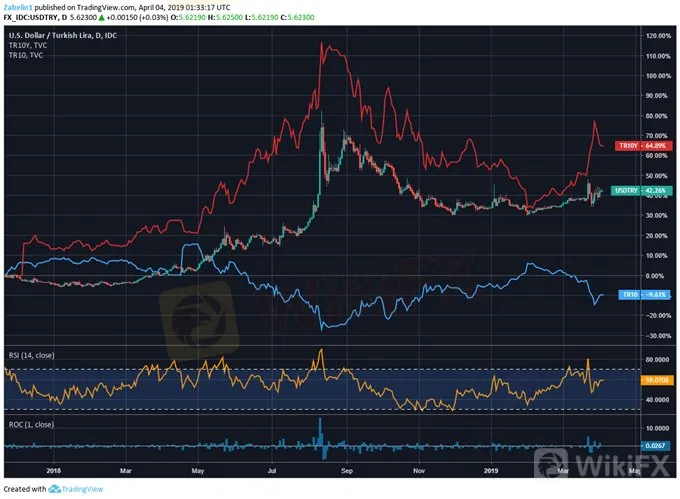简体中文
繁體中文
English
Pусский
日本語
ภาษาไทย
Tiếng Việt
Bahasa Indonesia
Español
हिन्दी
Filippiiniläinen
Français
Deutsch
Português
Türkçe
한국어
العربية
NZD, AUD, Emerging Markets at Risk from Rising US-Turkey Tensions
Abstract:The Australian and New Zealand Dollars along with emerging market assets may be rattled by rising US-Turkey tensions linked to an arms-purchasing disagreement.
TALKING POINTS – AUD/USD, NZD/USD, EMERGING MARKETS, TURKEY
NZD, AUD, emerging market currencies at risk from rising US-Turkey tensions
Renewed sanctions may follow as Ankara weighs buying Russian missile system
A US-Turkey dispute rattled markets in 2018... Is history going to repeat itself?
See our free guide to learn how to use economic news in your trading strategy!
The Australian and New Zealand Dollars along with emerging market assets are at risk from a dramatic spike in volatility as US-Turkey relations are once again under pressure. The dispute arises from Ankaras flirtation with purchasing the Russian S – 400 missile system. This is because at the same time, the US has been selling and delivering parts and materials for its stealth F-35 fighter jets to Turkey.
Yesterday, the Pentagon announced that it has halted all shipping operations until the Turkish government decides if it wants to purchase US or Russian military hardware. Washington has warned the Turkish government that such a purchase could result in the re-imposition of sanctions. This is because the Russian defense system is capable of shooting down F-35 fighter jets, thereby undermining US military power in the area.
The US has already implemented similar measures against Turkey in 2018 over the imprisonment of an American pastor. The Lira plummeted over 30 percent against the US Dollar, Turkish 10-year bond yields skyrocketed over 15 percent as investor confidence waned, and the economy was pushed to the brink. Fears of a contagion subsequently spread like wildfire and weighed on risk appetite.
USD/TRY, Turkish Bond Yields (Red), Prices (Blue)
Fears over a repeat of what happened last year are re-emerging, only the outlook for global growth now versus before is considerably less optimistic. Renewed tensions may be even more damaging for risk trends this around against a backdrop of trimmed global growth forecasts and broader uncertainty in geopoliticsand amid financial markets.
Much like in 2018, if the US reimposes sanctions against Turkey, it could spook emerging markets and cycle-sensitive assets like the Australian and New Zealand Dollar which may suffer. Conversely, the Japanese Yen, Swiss Franc and US Dollar may outperform if investor sentiment sours and turns toward capital preservation.
AUD/USD, NZD/USD, MSCI Emerging Markets ETF – Daily Chart
Disclaimer:
The views in this article only represent the author's personal views, and do not constitute investment advice on this platform. This platform does not guarantee the accuracy, completeness and timeliness of the information in the article, and will not be liable for any loss caused by the use of or reliance on the information in the article.
Read more

AUD/USD Eyes Upside on Potential Loan Prime Rate Cut in China
Australian Dollar eyes China’s monthly 1- and 5-year Loan Prime Rate fixing. Traders await news over US/China oil inventory releases and Biden’s Fed pick. AUD/USD downside may continue as bearish SMA crossover nears.

NZD/USD May Rise on Upbeat Card Spending Data, Broader Sentiment
NEW ZEALAND DOLLAR, NZD/USD, TRAVEL, COVID, ELECTRONIC CARD SPENDING - TALKING POINTS

FX Week Ahead - Top 5 Events: August RBA Meeting Minutes & AUD/USD Rate Forecast
The August RBA meeting minutes are due to be on Tuesday, August 20 at 01:30 GMT, and the tone is likely to come in on the dovish side.

AUD/USD: Australian Dollar at Risk Ahead of China Trade Balance
Spot AUDUSD remains at risk with looming China trade balance data due for release during Thursday's trading session.
WikiFX Broker
Latest News
High-Potential Investments: Top 10 Stocks to Watch in 2025
US Dollar Insights: Key FX Trends You Need to Know
Why Is Nvidia Making Headlines Everywhere Today?
Discover How Your Trading Personality Shapes Success
FINRA Charges UBS $1.1 Million for a Decade of False Trade Confirmations
Bitcoin in 2025: The Opportunities and Challenges Ahead
BI Apprehends Japanese Scam Leader in Manila
Big News! UK 30-Year Bond Yields Soar to 25-Year High!
SQUARED FINANCIAL: Your Friend or Foe?
Join the Event & Level Up Your Forex Journey
Currency Calculator






